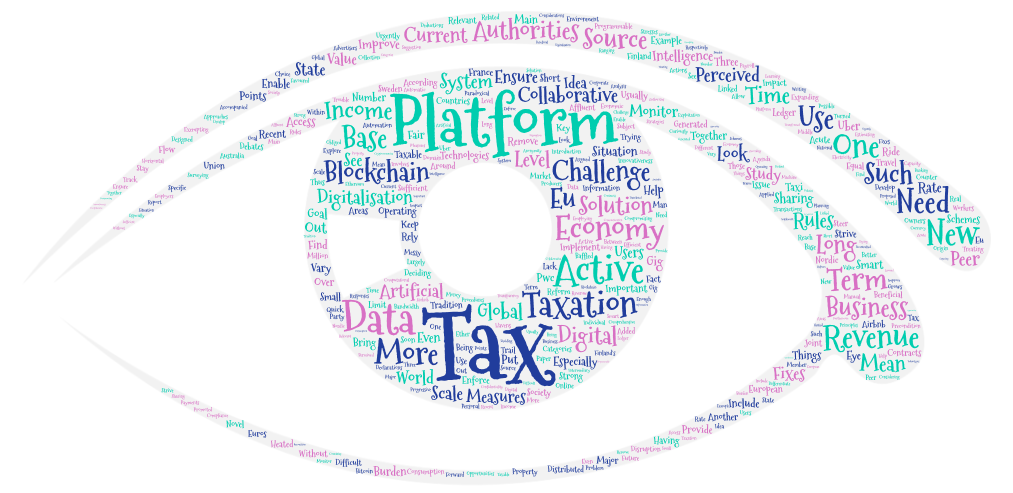Digitalisation and platform economy are usually perceived as a challenge to taxation as it is difficult to monitor and enforce taxation in the digital and global economy. New rules are needed for deciding which activities are taxable and which are not in the in sharing, collaborative and platform economies. A recent US study points out that platform businesses such as Uber and Airbnb have an impact on all three of the major categories of revenue sources: consumption taxes, income taxes and property taxes. The situation is especially relevant for Nordic countries, where the tradition of a strong tax base has been the precondition for an affluent society. The main goal is to develop taxation so that the platform economy can strive while ensuring sufficient tax revenue without compromising innovativeness.
The platform economy could, however, be the solution to these new challenges. If we have a more comprehensive look at taxation, expanding from acute challenges to long-term system-level opportunities, platforms together with blockchain and artificial intelligence technologies could help reform and improve taxation systems.

Why is this important?
Tax authorities around the world are urgently trying to find short-term and long-term fixes to the challenges linked to digitalisation and platforms. The sharing economy is one of the areas, where heated debates have accompanied the introduction of new tax measures (see e.g. Finland, France, Sweden, the US or Australia). Approaches vary from exempting small-scale peer-to-peer activities from taxes to treating gig workers as business owners or considering ride-sourcing equal to taxi travel. The importance of the issue is put into the scale in a study by PwC, estimating the value of transactions in Finland’s collaborative market in 2016 to over 100 million euros.
The European Union (EU) has been active in surveying tax challenges in the digital economy and collaborative economy. Counter measures are being designed and implemented by the Member States respectively, but joint actions and strategies on a European level and globally are also needed to ensure fair operating environment. The EU agenda stresses that all economic operators, including those in collaborative economy, are subject to taxation either according to personal income, corporate income or value added tax rules.
While the authorities are baffled, so are the individual users and producers of platforms. We are currently in a paradoxical situation, where online platforms rely on digitalisation and automation, yet the related tax procedures, deductions and declarations are largely a manual and messy burden.
Things to keep an eye on
The responses from tax authorities do not, and should not, limit to quick fixes within current tax schemes but also explore long-term considerations on principles of taxation and novel means to implement them. Examples of progressive ideas include the suggestion of a specific tax on digital economy and taxation of platforms based on bandwidth or other activity measures such as number of users, flow of data, computational capacity, electricity use or number of advertisers. It has also been proposed that tax rates should differentiate according to the origin of revenues to better steer platform-based business: a different tax burden for revenues generated by one-time access and another tax rate for revenues generated by data exploitation.
Curiously enough, the challenge could be turned into the solution, as the platform economy especially together with blockchain and artificial intelligence technologies could provide the means to more efficient future schemes of taxation. One key problem is that information of and data from platforms does not reach tax authorities. By employing blockchain and distributed ledger it would be possible to remove the need for any intermediary and improve transparency and confidentiality. For example, blockchain applied to payroll would enable removal of businesses as a middle man and allow automatic tax collection using smart contracts. And having data in distributed ledgers would enable analysis of that data for monitoring of tax compliance and horizontal communication between authorities among other things. In fact, blockchain has been argued to provide solutions from digitalisation challenges ranging from anonymity and lack of paper trail to tax havens.
Another forward-looking idea to taxation from the world programmable economy domain involves smart contracts, cryptocurrencies and programmable money, such as Bitcoin or ether by Ethereum. These are currently perceived as a source of trouble to tax authorities, but what if they were soon to be the favoured choice and solution promoted by the state as an active party? This would mean tax authorities having access to the information on payments, on which employers would be obliged to report. Authorities could thus stay on-track in real-time even when the banking and currency system grows more and more decentralised. Furthermore, even national tax planning and writing could be transformed using artificial intelligence and machine learning in time.
Selected articles and websites
Australian Taxation office: Providing taxi travel services through ride-sourcing and your tax obligations
Australian Taxation office: The sharing economy and tax
EUobserver: Nordic tax collectors set sights on new economy
European Commission: A European agenda for the collaborative economy and supporting analysis
European Parliament: Tax Challenges in the Digital Economy
France Stratégie: Taxation and the digital economy: A survey of theoretical models
IBM: Blockchain: Tackling Tax Evasion in a Digital Economy
Institute on Taxation & Economic Policy (ITEP): Taxes and the On-Demand Economy
Kathleen Delaney Thomas, University of North Carolina Law School: Taxing the Gig Economy
OECD: Addressing the Tax Challenges of the Digital Economy
PWC: How blockchain technology could improve the tax system
Sitra: Digitalisation and the future of taxation
Sky Republic: Automating & Assuring Trust Using Enterprise Blockchain in the Era of the Programmable Economy
Skatteverket: Delningsekonomi – Kartläggning och analys av delningsekonomins påverkan på skattesystemet
TEM: Jakamistalous Suomessa 2016 – Nykytila ja kasvunäkymät (Collaborative Economy in Finland –Current State and Outlook)
The Financial: Artificial Intelligence to transform tax world
Verohallinto: Jakamistalous
Wikipedia: Bitcoin
Wikipedia: Ethereum
WU & NET Team: Blockchain: Taxation and Regulatory Challenges and Opportunities, Background note
